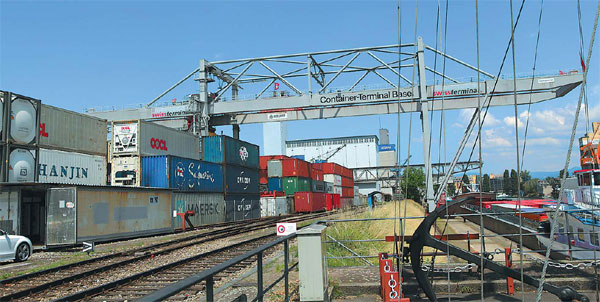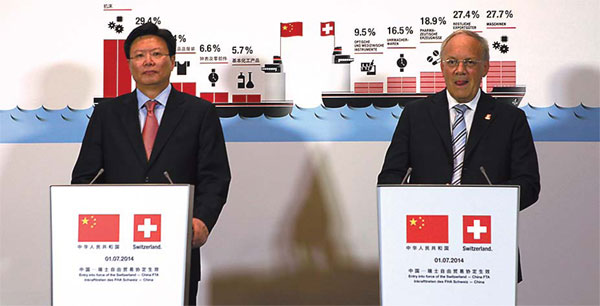Trade accord drives surge in ties
Updated: 2015-01-16 10:23
By Cecily Liu(China Daily Europe)
|
|||||||||||
Fta not only removes tariffs, but fosters cooperation in science and education
In little more than half a year since the free trade agreement between Switzerland and China came into force, it has greatly helped to accelerate business collaboration between the two countries.
The agreement granted zero tariffs on 99.7 percent of Chinese exports to Switzerland, and 84.2 percent of Swiss exports to China.
"The high public awareness created in Switzerland by the agreement has led to more visibility for business opportunities for Swiss companies in China," says Alain Graf, director of Swiss Business Hub in China, a government organization in charge of export and investment promotion in China.
More and more Swiss companies have been turning to China, and this trend is expected to continue as many smaller companies begin to make full use of the new regulations, Graf says.
"That a lot of enterprises have been starting to do so is proven by the ever growing number of requests we receive from Swiss companies about the agreement."
Switzerland is the second European state and the third member of the Organization of Economic Cooperation and Development to sign a free trade agreement with China. Iceland signed a deal in 2013 and New Zealand signed one six years earlier.
When products on which reduced tariffs are imposed are taken into account, the China-Switzerland agreement covers 99.99 percent of Chinese exports to Switzerland and 96.5 percent of exports the other way.
The agreement also covers matters including collaboration on tackling environmental issues, labor and employment matters and intellectual property protection.
Erik Jandrasits, trade affairs manager of Scienceindustries, a business association for the Swiss chemical, pharmaceutical and biotech industries, says the associations' member companies consider the agreement an important step in liberalizing trade between the partners and improving intellectual property protection.
Sonja Wollkopf Walt, CEO of GreaterZurich Area AG, says the free trade agreement also goes far beyond dismantling tariffs by fostering collaboration in fields including science, technology, research, education and culture.
Indicators from last year show the first positive effects, Walt says. The value of Swiss machinery exported to China rose 9.1 percent in the 10 months to October, to 2.3 billion Swiss francs ($2.3 billion, 1.95 billion euros), strong growth compared with other sectors.
Overall exports from Swiss companies to China rose 11.2 percent to 7.5 billion Swiss francs in the same period, and imports from China to Switzerland rose 7.7 percent to 10 billion Swiss francs, official figures show.
Despite the great opportunities the free trade agreement has brought to both countries, challenges still exist. Walt says one possible problem is that Switzerland's increased exports of professional mechanicals, watches, medicines and chemical products to China will impose pressure on these industries in China, and vice versa for labor-intensive products from China.
"However, the transitional agreements of the China-Switzerland free trade agreement on sensitive areas will provide space for Chinese and Swiss companies to adapt to market competition."
Xu Jinghu, Chinese ambassador to Switzerland, has previously said the agreement started to have an impact on China-Switzerland trade relations even before it came into effect, as many businesses prepared their strategies before the policy changes.
The agreement will not only help improve China-Swiss relations but also establish a model of collaboration that could encourage better Chinese relationships with other European countries, Xu says.
Bilateral relationships between China and Switzerland - political, economic and cultural - are now closer than ever, and both sides are searching for new areas of cooperation, particularly in science and finance, she says.
More than 30 Swiss secondary schools have started teaching Chinese, and last year more than 800,000 Chinese tourists visited Switzerland, and about 80,000 Swiss visited China, Xu says.
Walt says the Switzerland-China free trade agreement is highly significant for Switzerland because it and China are complementary economies, so the agreement offers many advantages for Swiss and Chinese multinationals and small and medium-sized enterprises.
"Thanks to the simplified access to the Chinese market, Swiss companies gain an advantage over their European competitors since in continental Europe only Switzerland enjoys such privileged access," Walt says.
Bilateral trade between China and Switzerland was worth $59.5 billion in 2013; it was $26.3 billion the previous year.
cecily.liu@chinadaily.com.cn
|
Basel, a major logistics center in Switzerland. |
|
China's ambassador to the World Trade Organization Yu Jianhua and Swiss Federal Councilor Johann Schneider-Ammann at the news conference announcing a free trade agreement coming into effect. Photos by Cecily Liu / China Daily |
(China Daily European Weekly 01/16/2015 page7)
Today's Top News
Italian president resigns
British hospital says has suspected Ebola case
Putin not to attend Auschwitz events
Turkey to help in foiling suspects from Xinjiang
Black Box of crashed AirAsia jet retrieved
Arson attack at paper that ran Charlie Hebdo cartoons
Improved screening to secure safe blood transfusion
Ambitious course set for global airliner market
Hot Topics
Lunar probe , China growth forecasts, Emission rules get tougher, China seen through 'colored lens', International board,
Editor's Picks

|

|

|

|

|

|







